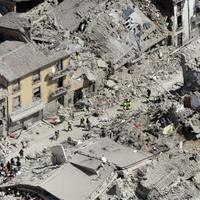COSA FARE DURANTE E SUBITO DOPO UN TERREMOTO - LIVELLO INTERMEDIO
WHAT TO DO DURING AND IMMEDIATELY AFTER AN EARTHQUAKE - INTERMEDIATE LEVEL
QUÉ HACER DURANTE E INMEDIATAMENTE DESPUÉS DE UN TERREMOTO - NIVEL INTERMEDIO
Durante un terremoto
During an earthquake
Durante um terremoto
1.
Se sei in un luogo chiuso, mettiti sotto una trave, nel vano di una porta o vicino a una parete portante.
|||||||sous||poutre|dans|encadrement|||||||||
||||||yourself|||beam||frame||||||||wall|supporting
|||||||||viga|||||||||||
If you are in an enclosed area, put yourself under a beam, in a doorway or near a load-bearing wall.
Als u zich op een gesloten plaats bevindt, plaats uzelf dan onder een balk, in een deuropening of in de buurt van een dragende muur.
2.
Stai attento alle cose che, se cadono, potrebbero colpirti (intonaco, controsoffitti, vetri, mobili, oggetti ecc.
||||||||te frapper|plâtre|plafonds suspendus||||
||||||they fall||to hit you|plaster|ceilings|windows|||
||||||caem||te atingir|reboco|teto|vidros|móveis||
Pay attention to the things that, if they fall, could hit you (plaster, countertops, glass, furniture, objects, etc.).
Cuidado com as coisas que, se caírem, podem bater em você (gesso, bancadas, vidros, móveis, objetos etc.
).
3.
Fai attenzione all'uso delle scale: spesso sono poco resistenti e possono danneggiarsi.
|||||souvent||||||se détériorer
||to the use||stairs|often|they are||resistant|||get damaged
||||escadas||||resistentes|||danificar-se
Pay attention to the use of the stairs: they are often not very resistant and can be damaged.
4.
Meglio evitare l'ascensore: si può bloccare.
|||||bloquear
Better to avoid the elevator: it can be blocked.
5.
Fai attenzione alle altre possibili conseguenze del terremoto: crollo di ponti, frane, perdite di gas ecc.
||||||||effondrement des|||glissements de terrain||||
||||||||collapse||bridges|landslides|losses|||
||||||||||pontes|deslizamentos de terra||||etc
Pay attention to the other possible consequences of the earthquake: collapse of bridges, landslides, gas leaks, etc.
6.
Se sei all'aperto, allontanati da edifici, alberi, lampioni, linee elettriche: potresti essere colpito da vasi, tegole e altri materiali che cadono.
|||éloigne-toi|||||||tu pourrais||frappé||||||||
||outside|get away||||streetlights||electrical|||||vases|tiles|||||
|||afaste-se||||lampiões||linhas elétricas|||||vasos|telhas|||||
If you are outdoors, move away from buildings, trees, street lamps, power lines: you may be hit by pots, shingles and other falling materials.
Se estiver ao ar livre, afaste-se de edifícios, árvores, postes de luz, linhas de energia - você pode ser atingido por panelas, ladrilhos e outros materiais que caem.
Dopo un terremoto
1.
Assicurati dello stato di salute delle persone attorno a te e, se necessario, presta i primi soccorsi.
|||||||around||||||you provide|||first aid
||||||||||||||||socorros
Make sure of the state of health of the people around you and, if necessary, provide first aid.
2.
Esci con prudenza, indossando le scarpe: in strada potresti ferirti con vetri rotti.
||prudence|wearing||||||yourself|||broken
||cuidado|usando||||||se machucar|||
Go out cautiously, wearing shoes: in the street you could hurt yourself with broken glass.
Saia com cuidado, calçado: na rua você pode se machucar com vidro quebrado.
3.
Se sei in una zona a rischio maremoto, allontanati dalla spiaggia e raggiungi un posto elevato.
||||||||éloigne-toi||plage|||||
|||||||tsunami|||||you reach|||
||||||risco|tsunami||||||||
If you are in a tsunami hazard area, move away from the beach and reach an elevated place.
4.
Raggiungi le aree di attesa previste dal Piano di protezione civile del tuo Comune.
||areas||waiting|foreseen||||||||
Reach|||||previstas||||||||
Reach the waiting areas provided for in your municipality's civil protection plan.
5.
Per quanto possibile, evita di usare il telefono o il cellulare.
As far as possible, avoid using your phone or mobile phone.
6.
Cerca di evitare l'uso dell'auto per non impedire il passaggio dei mezzi di soccorso.
|||||||to prevent||||||
Try to avoid using the car so as not to prevent the passage of emergency vehicles.

